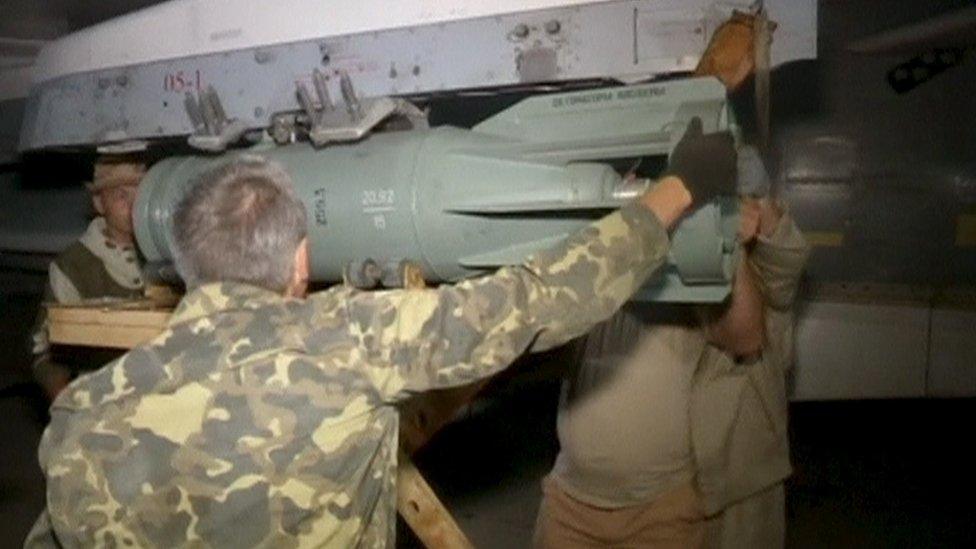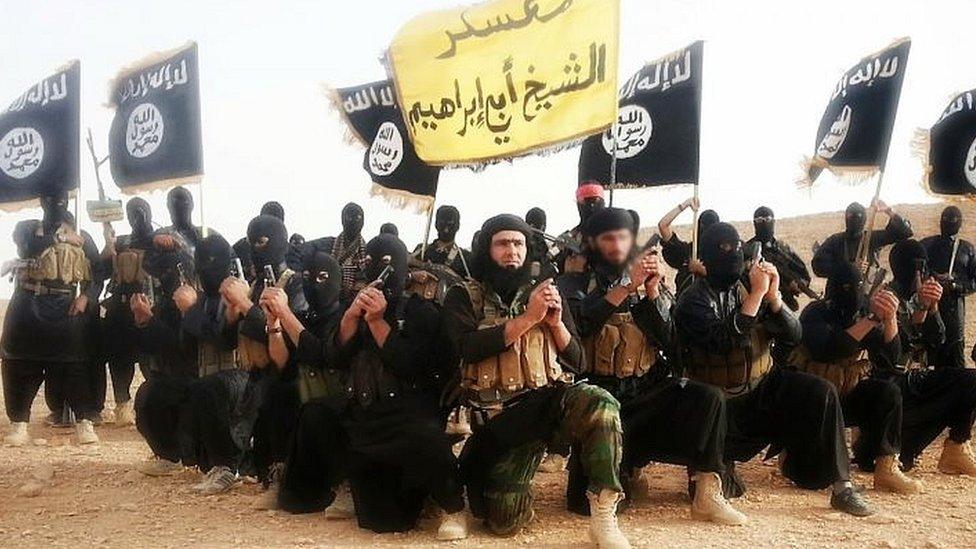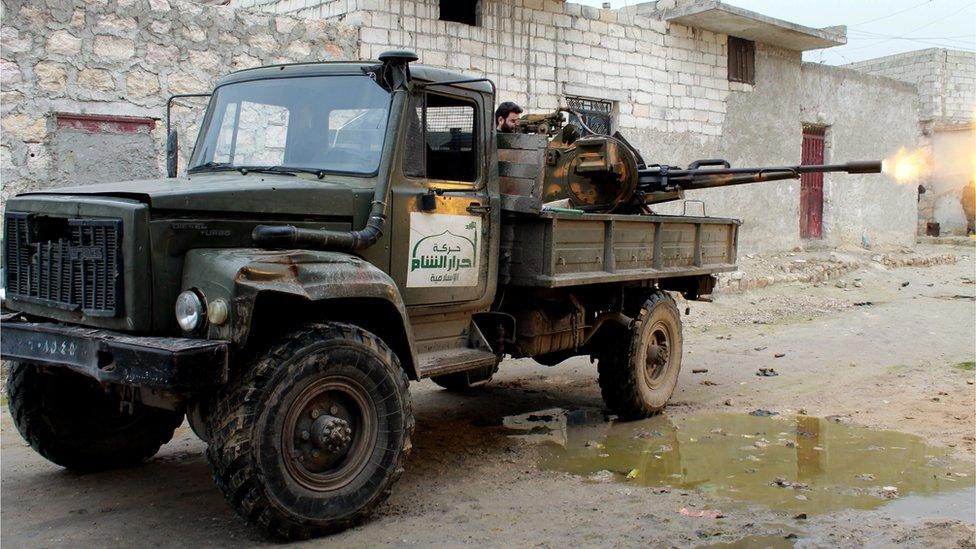Russia in Syria: What will happen next?
- Published

Russia says its operations in Syria could last for months
The strategic chessboard of the Middle East has been rattled severely this week with the sudden entry of advanced Russian warplanes into the already complex battlefields of Syria.
For Washington and its allies, including what little is left of the so-called "moderate Syrian opposition", this is deeply unwelcome, especially if the targets do turn out to include US-backed rebels. They see it as prolonging an unwinnable war and delaying the departure of a Syrian president who is now unacceptable to a large part of his population.
But for Syria's Assad regime and its Iranian allies, the arrival of Russian firepower is quite the opposite - it is a lifeline that could shore up the exhausted Syrian army, regain territory lost this year and crush all the rebel opposition except the hardcore jihadists of so-called Islamic State (IS) and the Nusra Front.
So what are the likely consequences?

Two different campaigns
The most immediate concern for Washington is that its air force collides, catastrophically, with Russia's in the skies over Syria.
Avoiding this is called "deconfliction" and it is supposed to be a carefully planned and co-ordinated process.
The US says it was given just one hour's notice on Wednesday to "clear the skies" before Russia's warplanes went in on their first bombing run, hitting Syrian rebel positions in the west of the country. Russia says it targeted IS, while US Senator John McCain says CIA-backed rebels were hit.

The US runs its air operations out of Al-Udaid Airbase in Qatar, allocating and prioritising IS targets across Syria and Iraq and sharing them out amongst the multinational coalition that includes several Arab countries.
But this week a new command centre has been announced, in Baghdad, where operations will be planned by Russia, Iran, Syria and Iraq.
This is the pro-Assad axis that wants to see Syria's President Bashar al-Assad remain in power. IS will undoubtedly feature on their target list but those four countries also consider all rebel groups opposed to Assad as the enemy.
This view does not fit in with that of the US-led coalition and will complicate and undermine the international effort to defeat IS.
Once the new Baghdad command centre is up and running there could then be two different command centres in the Middle East, operating two different campaigns against two different sets of enemies.

Recruiting tool
Despite the additional firepower of the newly arrived Russian air force, this development is very likely to be welcomed by the leadership of IS.
In order to maintain its global charisma it needs to constantly innovate, taking new territory, taking on new enemies or inventing new and ever more horrific ways of killing its captives.

IS is likely to use Russian attacks as a rallying cry to jihadists
The entry of Russia into the Syrian conflict, albeit in the air not on the ground, will be a perfect recruiting sergeant for IS.
The propaganda videos are doubtless already being prepared. The Russians are, after all, the same historic enemy fought by the Mujahideen in Afghanistan throughout the 1980s and eventually defeated (with US, Saudi and Pakistani help).
The prospect of Russian pilots attacking Muslim fighters on the ground will be embarrassing to Arab governments who will not want their air forces to be seen as on the same side.
The result is likely to be more recruits joining the extremists of IS and Al-Nusra, both from within Syria and from outside the region.

Eliminating groups
Sandwiched between the two big fighting forces of Assad's army and IS are a whole host of minor rebel groups with obscure names, like Tajammu al-Izza, who say they were hit by Russian air strikes on Wednesday.
Some of these groups are perceived by the West as being "moderate" but most have been steadily weakened and plagued by defections, defeats and capture.
With the reported arrival in Syria of hundreds of Iranian troops, the build-up there of Russian forces and a newly active Russian stance, the indications are that Assad and his allies are going after crushing the minor rebel groups, leaving only the extremists of IS and al-Nusra.
They will then be able to say: "Look, you may not like him but Assad is the only alternative to the medieval head-choppers of IS".

Arms boost
Saudi Arabia and possibly Turkey are not going to take this development lying down.
Along with some other countries in the region they have long insisted that the only lasting solution to the Syrian crisis is for President Assad to go.

Saudi Arabia and Turkey might step up weapons supplies to rebels groups they back
Since the Russians and Iranians are protecting him, both diplomatically and militarily, Saudi Arabia and Qatar have been quietly funding and arming various rebel Islamist groups inside Syria, prompting some to accuse them of supporting IS or al-Qaeda or both.
Back in 2013 the Saudis were all prepared to join in US attacks on Assad's forces as punishment for the mass poison gas attack on Syrian civilians.
When that did not materialise they stepped up their own support for Syria's Islamist rebel groups. Now that level of support is likely to be increased again, to match the newly bolstered might of Assad's forces.

Peace postponed
The net result of all this is likely to be a further prolonging of the stalemate in Syria.
As long as one side thinks it can win, or at least not lose, then it will be reluctant to come to the negotiating table and make substantial concessions.
There have been many times since 2011 when "Middle East experts" opined that President Assad was doomed and would not last the year. He has defied them all.
Now, with the injection of this Russian tonic, he will be more tempted than ever to tough it out. And so the fighting will continue, until eventually it boils down to Assad and his allies v IS and al-Qaeda, with Washington increasingly unable to influence the outcome.
Unless something changes dramatically, peace in Syria is not even on the horizon.